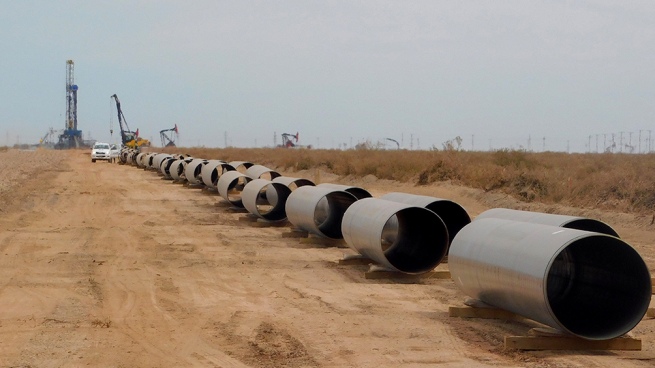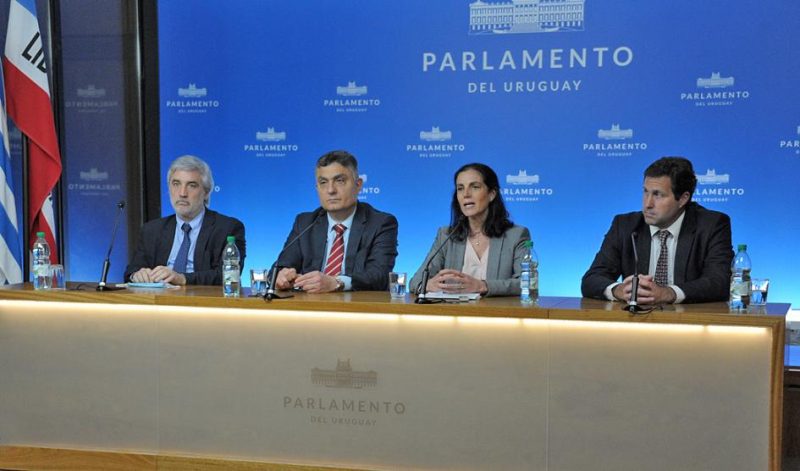Five companies and business consortiums presented this Friday technical-economic offers in the tender for the construction of the first stage of the President Néstor Kirchner Gas Pipeline and complementary works, which the Minister of Economy, Silvina Batakis, considered a “fundamental work for the next 30 years “.
The bidders were BTU; the consortium made up of Techint and Sacde; TGS; Esuco and the Temporary Union of Companies (UTE) Víctor Contreras-Contreras Hermanos.
The bidding act was led by the president of Energía Argentina SA (Enarsa), Agustín Gerez, who pointed out that it was “a historic day” with a project that “will transform the economy of Argentina.”
According to official sources, by the winter of 2023, before the execution of the compression works planned for this segment, the gas pipeline will already provide 11,000,000 m3/day of new capacity
For his part, the Secretary of Energy, Darío Martínez, stressed that Enarsa “has been meeting the deadlines as established” and that, once completed, the gas pipeline “will place Argentina on a path of greater energy security, with the possibility of having gas feasibility in all provinces, substituting imports and saving foreign currency”.
Batakis – who, like Martínez, connected to the event remotely – celebrated “teamwork” both with Enarsa and with “the business sector, which is what is going to generate jobs and economic growth”.
Batakis said that the construction of the Gas Pipeline will “expand the energy capacity”
The Minister of Economy, Silvina Batakis, stressed this Friday that the construction of the President Néstor Kirchner Gas Pipeline will allow “expanding energy capacity”, a condition that she considered “fundamental to release the country’s productive activity.”
The head of the Palacio de Hacienda participated this afternoon remotely in the bidding act for the construction of the first stage of the gas pipeline, in which five bidders were presented.
Batakis celebrated “teamwork” both with Energía Argentina SA (Enarsa) and with “the business sector, which is what is going to generate jobs and economic growth.”
“In Argentina we need a more diverse, more complex productive matrix, and this work is essential for the next 30 years in Argentina”highlighted the official, to later remark that “energy is the cost of costs in business matters”, because “without energy there is no possibility that we can establish companies”.
In his exhibition, Batakis highlighted the importance of the work to “expand energy capacity.”
The gas pipeline, completed, “It is essential to release the country’s productive activity, and we are working on that with all sectors.”
For his part, Gerez maintained that the construction of the gas pipeline is a strategy resulting from “Alberto and Cristina’s decision,” referring to President Alberto Fernández and Vice President Cristina Fernández de Kirchner.
The President Néstor Kirchner Gas Pipeline was highlighted on several occasions by national government officials as the most important infrastructure work of the last 40 years, and will allow the transport of unconventional gas generated in the Vaca Muerta area (Neuquén) with the main centers consumption of the country
In this regard, he pointed out that “since that DNU (alluding to DNU 76/2022 of February 11) we began to work without ceasing.”
In that sense, he indicated that “the environmental impact studies have been completed” and that “the pipes were obtained in a state of confusion due to the international conflict of public knowledge.”
With the commitment to have the first stage of the gas pipeline in operation by the winter of 2023, the head of Enarsa stressed that “the schedule is very tight” and represents “a challenge”.
Likewise, he assured that “Alberto’s instruction with the DNU entails full confidence in our teams”, and highlighted that Enarsa “being a central act in this process fills us with honor and pride”.
It is “the most important work of the last 40 years,” said Martínez
The Secretary of Energy, Darío Martínez, stated that the construction of the President Néstor Kirchner Gas Pipeline is “the most important infrastructure work of the last 40 years” and that it will place Argentina on “a path of greater energy security.”
Martínez participated remotely in the bidding act for the completion of the first stage of the gas pipeline, in which he praised the “great work” carried out by the state-owned firm Energía Argentina SA (Enarsa), which is at the forefront of the bidding process. .
The Secretary of Energy stressed that this process “is being carried out as established.”
Martinez too highlighted the implementation of the Gas Plan in 2020, which “allowed to stop the decline in production”.
In reference to the gas pipeline, the official said that “this work will position Argentina on a path of greater energy security, with the possibility of having gas activity in all provinces, substituting imports and saving foreign exchange.”
He also indicated that it will allow “many industrial parks to have the possibility of having gas, that many Argentine men and women in each of our provinces have gas at a competitive price.”
“We will be able to continue advancing in the reconstruction of a more federal Argentina”, he stressed, in addition to pointing out that in the framework of economic recovery “the private sector pushes and there are more job opportunities.”
The President Néstor Kirchner Gas Pipeline was highlighted on several occasions by national government officials as the most important infrastructure work of the last 40 years, and will allow the transport of unconventional gas generated in the Vaca Muerta area (Neuquén) with the main centers of consumption in the country.
Through an extension of 467 kilometers, the second stage will allow natural gas to reach San Jerónimo (south of the province of Santa Fe), adding another 17 million m3/day and opening the possibility of supplying large urban hubs and industries in the center and north of the country
In this way, it is expected that with its completion not only will the supply of gas to industrial, commercial and residential users increase, but also fuel import costs will be substantially reduced, which will result in significant fiscal savings.
The work will be built in two stages: the first will connect the Tratayen industrial park, located in Vaca Muerta, with the Buenos Aires city of Salliqueló, covering a distance of 558 kilometers and expanding the gas supply by 22 million cubic meters per day to the Area. Metropolitan of Buenos Aires (AMBA).
According to official sources, by the winter of 2023, before the execution of the compression works planned for this segment, the gas pipeline will already provide 11,000,000 m3/day of new capacity.
Through an extension of 467 kilometers, the second stage will allow natural gas to reach San Jerónimo (south of the province of Santa Fe), adding another 17 million m3/day and opening the possibility of supplying large urban hubs and industries in the center and north of the country, as well as the opportunity to export surpluses to Brazil and Chile.








